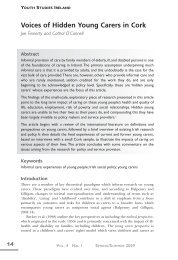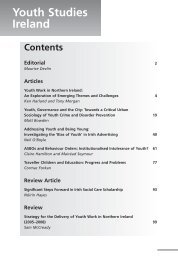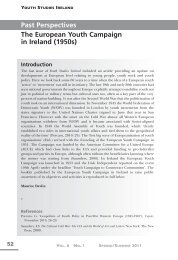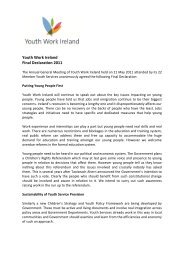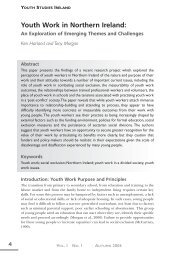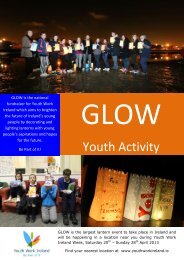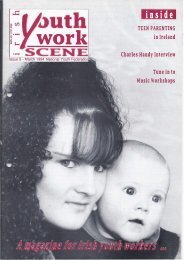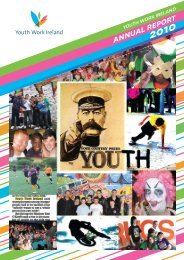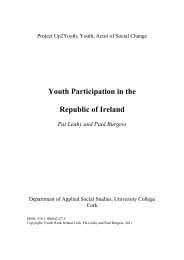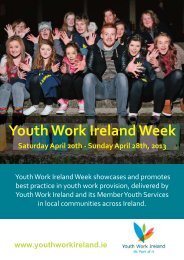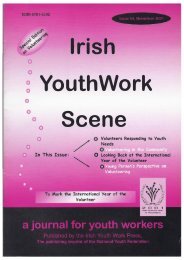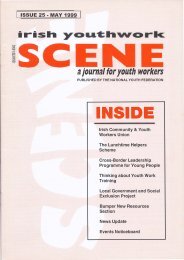Issue 31: March 2001 - Youth Work Ireland
Issue 31: March 2001 - Youth Work Ireland
Issue 31: March 2001 - Youth Work Ireland
Create successful ePaper yourself
Turn your PDF publications into a flip-book with our unique Google optimized e-Paper software.
1 Review approaches to using information1 Store and retrieve the info rmation needed1 Cut down on the info rmation not needed1 Share & exchange information effectively1 Understand the legal aspects of info rmation handling1 Use info rmation technology effectivelyservices. It was important to fi nd out what happens toyoung people on leaving care and after they leave care.Thus Focus <strong>Ireland</strong> made a decision to carry out thislongitudinal study on young care leavers. The overall aimof the study was to provide baseline information on youngpeople leaving state care. The main aims were to :Illustrated throughout with examples based onexperience, this book will help users to see information asan asset to their organisation rather than a liability.VTO Spells SuccessEdited by Helen Keogh and Tony DownesThe stories in this collection are living documentaries ofordinary people undergoing an extraordinary experienceof self-transfo rmation, self-discovery and personalfulfilment through returning to formal learning as adults .In them we hear the voices of people from all over thecountry give vivid and often moving testimony to theirindividual courage, spirit, determination, good humourand optimism in the face of sometimes daunting personalhistories and circumstance.The stories affirm the exceptional contribution andeffectiveness of VTOS as an education and trainingintervention in the lives of long-term unemployed people -confirming that for the contributors VTOS did indeed spellsuccess.They also offer valuable insights into theimportance of a well-developed, well resourced andflexible adult education and training initiative in effecting adramatic transformation in the life opportunities of peoplehithero excluded from the benefits of a buoyant economy.In addition, they highlight the determination andcommitment to serious effort that unemployed people areprepared to make when given a meaningful opportunity tochange their circumstances.The idea for this volume came from the storiesencountered in VTOS centres in every VEC area of theremarkable people who have participated in the schemesince its launch in 1989. Through VTOS reality has beengiven to a key phase of lifelong learn ing by putting inplace a vital step in the lifelong learning pathway, via., freefu ll-time provision for adults who wish to resume andcontinue their learn ing to post-primary level and beyond.Left Out on Their own : Young People Leaving Carein <strong>Ireland</strong>By Patricia Kelleher, Carmel Kelleher & MariaCorbettMany homeless young people who had been in the careof the state came to the attention of Focus<strong>Ireland</strong>1 Describe the background and recent developments inthe foster care and residential care system in <strong>Ireland</strong>.1 Carry out three separate surveys of young peopleleaving care in order to monitor the circumstances ofcare-leavers six months and again two years after leavingcare. The main research tool used is a Monitoring Formwhich was filled out by social workers and care staff.1 Undertake intensive interviews with 30 care leavers andto construct 70 case histories of young care-leaversbased on info rmation from the monitoring survey, fromsocial workers and residential care workers, and frominterviews with the young people themselves.• Analyse leaving care policy and practice based on themonitoring survey, documentary material, focus groupdiscussions with social workers, staff from specialschools, residential child care centres and aftercareservices, discussions with staff of Traveller Families Care(an organisation for Travellers in care), discussions withmembers of the Irish Association of Yo ung People inCare, members of the Irish Foster Care Association anddiscussions with groups concerned with youth at risk inthree Dublin communities.This research now confirms that experience: one-third ofthe young people leaving the care of the health boardsand over half of those leaving special schools for youngoffenders experience episodes of homelessness or spendtime in detention centres at some stage during their firstsix months. By the time they have been two years out ofcare , the situation deteriorated even further: a quarter ofthe young people leaving health board care have been indetention centres and two-th irds of those leaving specialschools have been in detention centres and a third havebeen homeless. This report identifies serious deficienciesin the provision for children in the care of the state in<strong>Ireland</strong>.It makes painful reading for policy makers andpractitioners. The challenge for all of us is to face thesehard realities and endeavour to address them.All of these titles and others on relatedtopics are available on loan (NOT SALE)from the IYWC, an official sales agent inthe Republic of <strong>Ireland</strong> for Russell HousePublishing, Nightshift Publications,Directory of Social Change, National <strong>Youth</strong>Council of <strong>Ireland</strong>, and the CombatPoverty Agency.Further Information from:Fran Bissett & Michelle DrummIrish <strong>Youth</strong><strong>Work</strong> CentreNational <strong>Youth</strong> Federation20 Lower Domin ick StreetDublin 1Tel: (01) 8729933 Fax: (01) 8724183E-mail: fbissett@nyf.ie or mdrumm@nyf.ieIrish <strong>Youth</strong><strong>Work</strong> Scene•<strong>March</strong> <strong>2001</strong>



